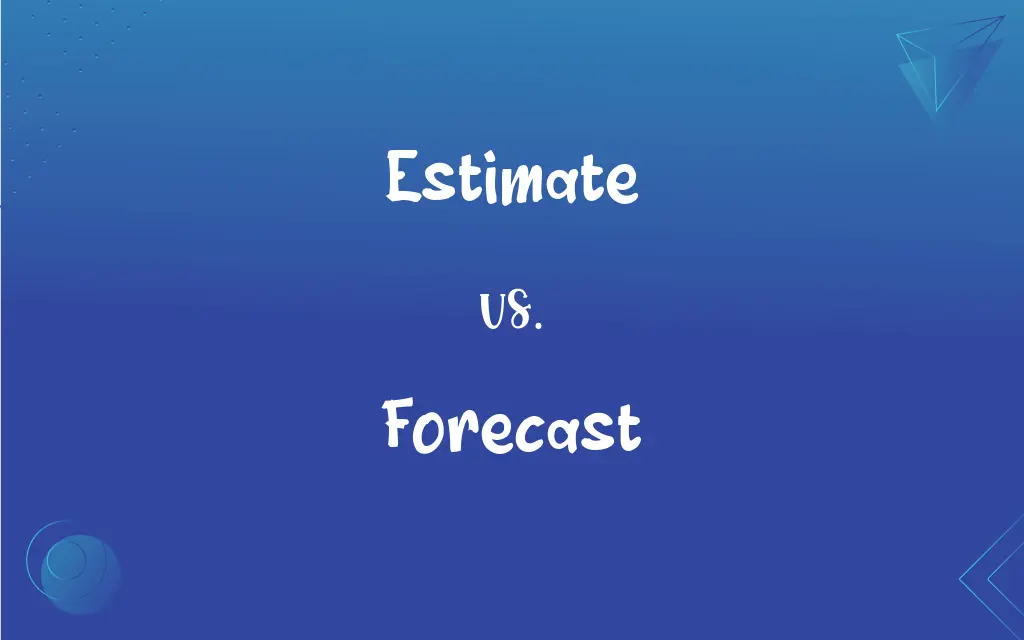Estimate vs. Forecast: What's the Difference?
Edited by Aimie Carlson || By Harlon Moss || Updated on November 2, 2023
An estimate is a rough calculation or judgment of value, quantity, or extent, whereas a forecast is a prediction of future events or trends, often based on analysis of data.

Key Differences
An estimate refers to an approximate calculation or judgment of the value, number, quantity, or extent of something. It is generally based on limited information or data and is used to give a general idea rather than an exact number. On the other hand, a forecast is a prediction or projection about a future event, typically based on analysis of trends, patterns, and data. It is often used in the context of weather, economics, or business planning.
Estimates are often used in scenarios where an immediate approximation is needed. They serve as educated guesses and are typically non-binding. Forecasts, however, involve more complex analysis and modeling, aiming to predict what will happen in the future based on current and past information. They are often used in planning and preparing for future conditions.
In the context of project management, an estimate is usually related to how much time or resources a task will consume. Forecasts, conversely, might involve projecting project milestones or completion dates based on progress reports. While an estimate often aids in setting initial expectations, a forecast can be used to adjust those expectations as a project unfolds.
When it comes to finance, an estimate might refer to the anticipated cost of a project or an item. A forecast, in this domain, is likely to refer to economic conditions, stock market trends, or financial performance of a business over a period. Financial estimates are often static figures, while financial forecasts can change with new data and market movements.
While estimates are crucial in the early stages of planning and budgeting, they are often qualitative. Forecasts are more quantitative, offering a more sophisticated and data-driven look at what the future might hold. Both play critical roles in decision-making but are utilized differently based on the purpose, data availability, and the degree of certainty required.
ADVERTISEMENT
Comparison Chart
Definition
An approximation or informed guess.
A prediction based on data and analysis.
Data Usage
Limited or no data; qualitative.
Extensive data; quantitative.
Timeframe
Present or past-focused.
Future-oriented.
Precision
Generally less precise.
Aims for higher precision.
Field Examples
Construction cost, project duration.
Weather trends, market analysis.
ADVERTISEMENT
Nature
Often static once made.
Dynamic, may be updated with new info.
Estimate and Forecast Definitions
Estimate
An approximation of cost or time.
Her estimate for completing the project was three weeks.
Forecast
A prediction of future events or trends.
The weather forecast calls for rain this weekend.
Estimate
A rough calculation or judgment.
The contractor made a quick estimate of the materials needed for the repair.
Forecast
An anticipation of future demand or sales.
The sales forecast was adjusted to account for the new product line.
Estimate
An educated guess based on experience.
He gave an estimate of the crowd size based on the number of tickets sold.
Forecast
A projection of data or economic trends.
The financial forecast shows a potential increase in profits.
Estimate
A preliminary assessment of a situation.
The estimate for the damages was higher than expected.
Forecast
A weather prediction.
The storm forecast has prompted a citywide evacuation.
Estimate
An informal valuation of property or goods.
The antique dealer gave me an estimate of the vase's worth.
Forecast
A planning tool for future conditions or outcomes.
Their forecast included a detailed timeline for product development.
Estimate
To calculate approximately (the amount, extent, magnitude, position, or value of something).
Forecast
To estimate or predict in advance, especially to predict (weather conditions) by analysis of meteorological data.
Estimate
To form an opinion about; evaluate
"While an author is yet living we estimate his powers by his worst performance" (Samuel Johnson).
Forecast
To serve as an advance indication of; foreshadow
Price increases that forecast inflation.
FAQs
Is an estimate considered less accurate than a forecast?
Generally, yes, since estimates are less data-driven than forecasts.
What is a forecast?
A forecast is a prediction of future events based on analysis of past and current data.
What is an estimate?
An estimate is an approximate calculation, often used where exact data is unavailable.
Can an estimate be used for future events?
Yes, estimates can be made for future events but they are rough approximations without thorough analysis.
How often are forecasts updated?
Forecasts can be updated regularly as new data comes in, whereas estimates are less frequently adjusted.
How does one improve the accuracy of a forecast?
By using more robust data, improving models, and frequently updating the forecast as new information arrives.
How does one determine the reliability of a forecast?
Reliability is gauged by the forecaster's expertise, the data quality, and the analysis method.
Do estimates require expert knowledge?
They can benefit from it, but non-experts can also make general estimates.
Can forecasts be made without data?
Effective forecasts typically require data; without it, they're mere speculation.
Why is forecasting important in business?
It helps in strategic planning, budgeting, and anticipating market changes.
What fields use estimates?
Construction, project management, and budgeting often use estimates.
Are forecasts only for weather?
No, forecasts are used in various fields including economics, business, and environmental science.
Can anyone make a forecast?
While anyone can attempt a forecast, accurate forecasting usually requires expertise and analysis.
Are estimates more common in day-to-day life than forecasts?
Yes, people often make estimates in daily life, while formal forecasts are more common in professional contexts.
Do estimates deal with quantities or qualities?
Estimates can involve both quantities (like time or cost) and qualitative assessments.
Are estimates subject to change?
Yes, as more information becomes available, estimates can be refined.
Can estimates be used in forecasting?
Yes, estimates can be a starting point for a forecast, especially when precise data is not yet available.
What tools are used for making forecasts?
Statistical models, computer software, and analytical tools are commonly used for forecasting.
Is a cost estimate binding?
Cost estimates are not usually binding; they are subject to change upon detailed analysis.
Are all forecasts accurate?
No, forecasts are not always accurate; they are subject to uncertainty and changes in conditions.
About Author
Written by
Harlon MossHarlon is a seasoned quality moderator and accomplished content writer for Difference Wiki. An alumnus of the prestigious University of California, he earned his degree in Computer Science. Leveraging his academic background, Harlon brings a meticulous and informed perspective to his work, ensuring content accuracy and excellence.
Edited by
Aimie CarlsonAimie Carlson, holding a master's degree in English literature, is a fervent English language enthusiast. She lends her writing talents to Difference Wiki, a prominent website that specializes in comparisons, offering readers insightful analyses that both captivate and inform.
































































